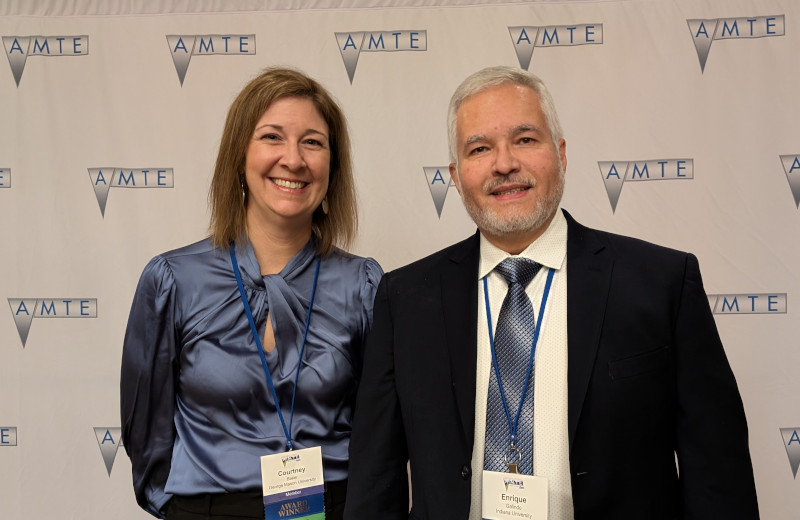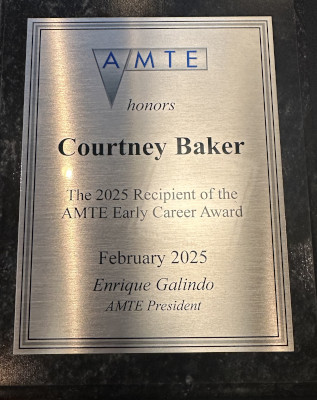Courtney Baker, Faculty in the Mathematics Specialist Leadership Program, Receives the Association of Mathematics Teacher Educators’ Early Career Award
May 6, 2025
Courtney Baker, Academic Program Coordinator and associate professor in the Mathematics Specialist Leadership Program within the School of Education at George Mason University, was honored with the Early Career Award presented by the Association of Mathematics Teacher Educators (AMTE). The AMTE Early Career Award is given in recognition of a mathematics teacher educator who, while early in their career, has made distinguished contributions and shows exceptional potential for leadership in one or more areas of teaching, service, and/or scholarship. Baker received the award during the AMTE Annual Conference held in February of this year.

Courtney Baker was presented with the Early Career Award by the Association of Mathematics Teacher Educators.
In being named recipient of the Early Career Award, Baker was cited for the extensive research she has conducted that is focused on the education and professional development of mathematics teachers, specialists, teacher leaders, and coaches. Among her many accomplishments, Baker has made significant contributions to STEM education and has led efforts to integrate the study of STEM with problem-based learning, an endeavor which has earned her widespread praise and respect from the higher education community. She has also been successful in coordinating and advancing the online master’s degree for mathematics specialist leaders, a program offered at George Mason which reflects Baker’s commitment to enhancing mathematics education and providing teachers with the guidance and support to strengthen their mathematics-specific pedagogical practices.
The scholarship produced by Baker has appeared in numerous peer-reviewed publications in mathematics education, STEM education, and teacher education. These include Journal of Technology and Teacher Education; Journal of Mathematics Teacher Education, Investigations in Mathematics Learning; School Science and Mathematics; Studying Teacher Education; Journal of Mathematics and Science: Collaborative Explorations; Interactive Technology and Smart Education; Journal of Mathematics Education at Teachers College; Professional Development in Education; Mathematics Teacher Educator; International Journal of Science and Mathematics Education; and School-University Partnerships, International Journal of STEM Education.
Her extensive research also serves as the basis for a book she co-authored titled Proactive Mathematics Coaching: Bridging Content, Context, and Practice. The book introduces readers to the “Proactive Coaching Framework” which helps educators who are tasked with designing a professional learning experience for their colleagues or school district administrators with the objective of improving the quality and effectiveness of K-12 mathematics instruction. The book embraces the research-based “Principles to Action: Ensuring Mathematical Success for All,” which sets forth a core set of essential mathematics teaching practices developed by the National Council of Teachers of Mathematics (NCTM, 2014).

Baker’s nomination for the award was supported by a large group of scholars and peers from George Mason and other universities across the country with whom she has collaborated during her ten-year career in higher education. A review of the nomination materials submitted on Baker’s behalf shows the deep respect and admiration that these individuals have for her. The materials recommending Baker for the Early Career Award included a letter of nomination accompanied by two letters of support that addressed her specific strengths and accomplishments. In total, the signatories included close to two dozen scholars and peers who elaborated on Baker’s scholarship and service in support of mathematics education and teaching. The considerable number of Baker’s colleagues who signed these materials is a testament to the high regard in which she is held.
Baker shared her thoughts about her colleagues and peers who coalesced in support of her selection for the AMTE Early Career Award. She stated, “What was especially meaningful for me was the connection and relationship I have been able to build with each of these individuals through networking, mentoring, and collaboration. These are trusted colleagues with whom I have shared beneficial learning and mentoring experiences during my career. These individuals came together as a community of scholars to highlight and elevate the value of my work. They became my advocates in raising awareness of the significant impact my research has had in the field of mathematics education leadership and in the professional development of mathematics specialists and leaders.”
In her other remarks, Baker commented on the potential of mathematics specialists, mathematics specialist leaders, and mathematics educators to become agents of change. She stated, “It is important for us to think about how we conceptualize teacher leadership, not only in mathematics education but more broadly in all education disciplines. There are many things in K-12 schools that can be improved. Therefore, broadening the concept of who can be a leader capable of bringing about change becomes important. A leader is not going to be a single mathematics coach or teacher working in isolation. The notion that one person can single-handedly effect change in school policies or practices is where we hit barriers and obstacles.”
Baker continued, “We know that change can be a slow process and sometimes educators may feel they lack the agency to effect the reforms they would like to see implemented in their schools or school districts. But when we start working in tandem and consider all the different spaces where an educator, regardless of their position, can engage in leadership—whether it is a classroom teacher, a department chair, a school-based mathematics coach, or a mathematics specialist at the school or district level—individuals in these roles can advocate for positive change within their own spaces.”
“In my research as a mathematics teacher educator,” Baker explained, “my focus is to determine how we can ensure that these individuals are provided the knowledge and skills they need to view themselves as leaders. When they identify as being a leader, they can collectively work together to shift the status quo and implement important initiatives like research-informed mathematics teaching, equitable mathematics practices, rich mathematics tasks, and other positive reforms that will improve teaching and learning. We want to prepare these individuals so that they recognize their own potential to be the agents of change that students and schools need.”
Baker offered her observations on some of the major challenges facing mathematics teacher education today. Among these, she referenced the ongoing recovery from the disruptions, school closures, and shift to remote learning that happened during the Covid pandemic. At the height of the pandemic, learning did not occur normally. Consequently, students experienced a loss in learning that is borne out by lower achievement scores in core subject areas that are being seen today. Baker pointed out that the post-Covid response in mitigating learning loss has differed from school to school across the country. However, she emphasized that in addressing the learning loss that occurred in mathematics, the primary goal should be to help students develop their critical thinking skills. Baker explained, “We need to remember that it is as important to focus conceptual understanding of mathematics which consists of rich and rigorous problem-solving and showing students how mathematics relates to their everyday lives. When students discover the relevance of mathematics, they can find joy in it, and they will have a desire to further explore it.”
She continued, “There is this idea that if we just focus on procedures and have students memorize mathematical facts, their learning will be fine. But the research shows this is not the case. Children need to know conceptually the ‘why’ and the ‘how’ and they need those problem-solving and problem-posing experiences. This is especially important as we prepare today’s K-12 students to be career-ready for the highly technical jobs that will emerge in the next ten to fifteen years or beyond—jobs that will require the combination of a comprehensive conceptual understanding of mathematics and critical thinking skills.”
Another challenge that Baker is concerned about relates to the current cutbacks in teacher preparation grants. She cautions that these funding reductions may exacerbate the shortage of mathematics teachers in Virginia. “People have left teaching and not as many people are coming into the field,” Baker stated. “And some individuals hired to teach are new to the profession and may not have the necessary experience or appropriate licensure. When you do not have a licensed math teacher who knows how to teach math, it is hard to engage kids.”
Baker concluded her remarks emphasizing, “We need knowledgeable educators to teach math in multiple ways so that more kids can access rich and rigorous mathematics. We also need to change the narrative of mathematics so that it is not viewed as a ‘gatekeeper’ that discourages individuals from becoming mathematics teachers because they have a fear of math. We should instead view mathematics as a ‘gateway’ to a rich subject area in which dedicated, qualified teachers can help their students thrive.”
The College of Education and Human Development extends its congratulations to Courtney Baker for her achievements that led to her being selected for the Early Career Award presented by the Association of Mathematics Teacher Educators (AMTE). The AMTE Early Career Award reflects her dedication and the many contributions she has made in mathematics education and teacher preparation.
